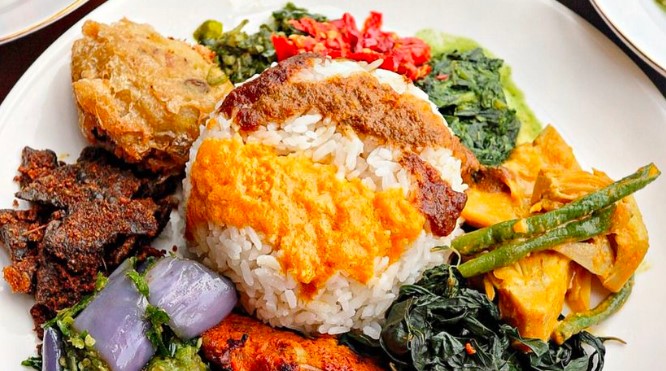Introduction: The Richness of Indonesian Cuisine
Indonesian cuisine is a must-try delight for food enthusiasts from all over the world. It is diverse, flavorful, and has a rich culinary heritage that has been influenced by various cultures through centuries of trade and colonization. The food is known for its unique combination of spices, herbs, and sauces, and is often characterized by its boldness, complexity, and aroma.
Indonesia is comprised of over 17,000 islands, each with its own distinct culinary traditions. However, despite the differences in regional cuisine, the food of Indonesia is unified by a common love for spicy, sweet, and savory flavors. The cuisine is a reflection of the country’s history, geography, and cultural diversity, making it a unique and rich experience for anyone who wants to explore it.
The Influences on Indonesian Cuisine
Indonesian cuisine has been influenced by a range of cultures, including Indian, Chinese, Malay, Arab, and European. The spice trade has been a significant factor in shaping the cuisine, leading to the introduction of various spices and herbs such as cloves, nutmeg, and turmeric. Indian and Chinese traders have also introduced their cooking techniques and ingredients to the cuisine, such as noodles and tofu.
The Dutch colonization of Indonesia also had a significant impact on the cuisine, with the introduction of new ingredients such as potatoes, cabbage, and carrots. The Dutch also brought with them their love for pastries and cakes, which has resulted in the popularity of sweet snacks and desserts in Indonesian cuisine.
The Diversity of Indonesian Cuisine
Indonesian cuisine is highly diverse, with each region in the country having its own unique culinary traditions. The food of Sumatra, for example, is known for its spiciness and the use of coconut milk, while the cuisine of Java is characterized by its sweetness and the use of soy sauce. Bali is known for its use of fresh herbs and spices, while Sulawesi is famous for its seafood dishes.
Other regions, such as Kalimantan and Papua, have their own distinct culinary traditions that are influenced by their indigenous cultures. This diversity makes Indonesian cuisine a unique and exciting experience for food enthusiasts.
The Key Components of Indonesian Cuisine
The key components of Indonesian cuisine are rice, spices, herbs, and sauces. Rice is a staple food in Indonesia and is eaten with almost every meal. Spices and herbs are used extensively in Indonesian cuisine, with the most commonly used ones being coriander, cumin, turmeric, ginger, and lemongrass. Sauces such as sambal, kecap manis, and peanut sauce are also essential to Indonesian cuisine.
Coconut milk is another important ingredient in many Indonesian dishes, adding creaminess and richness to the food. Other ingredients used in Indonesian cuisine include seafood, meat, vegetables, and fruit.
The Popular Dishes of Indonesian Cuisine
Some of the most popular dishes in Indonesian cuisine include nasi goreng (fried rice), satay (grilled meat skewers), rendang (spicy beef stew), gado-gado (vegetable salad with peanut sauce), and soto ayam (chicken soup). Other dishes include mie goreng (fried noodles), nasi uduk (coconut rice), and nasi kuning (yellow rice).
Indonesia is also famous for its street food, with vendors selling a variety of snacks and desserts such as martabak (pancake filled with meat or cheese), bakso (meatball soup), and klepon (glutinous rice balls filled with palm sugar).
The Best Places to Explore Indonesian Cuisine
Indonesia has a vibrant food scene, with many restaurants, street vendors, and markets offering a range of Indonesian dishes. Jakarta, the capital city, is a great place to start exploring Indonesian cuisine, with its many restaurants and street food vendors serving up a variety of dishes.
Other cities such as Yogyakarta, Surabaya, and Bandung are also known for their culinary offerings. Bali, with its fresh seafood and Balinese cuisine, is another great destination for food enthusiasts.
The Signature Flavors of Indonesian Cuisine
The signature flavors of Indonesian cuisine are sweet, spicy, and savory. The use of spices and herbs such as coriander, cumin, and turmeric gives the food a complex and aromatic flavor. The combination of sweet and savory flavors in dishes such as rendang and gado-gado is also a hallmark of Indonesian cuisine.
Chilies are used extensively in Indonesian cuisine, with dishes such as sambal and satay being spicy favorites. Sweet flavors are also prevalent in Indonesian cuisine, with the use of palm sugar and kecap manis (sweet soy sauce) adding sweetness to many dishes.
The Health Benefits of Indonesian Cuisine
Indonesian cuisine is known for its use of fresh ingredients and spices, making it a healthy and flavorful cuisine. Coconut milk, which is used extensively in Indonesian cuisine, is a good source of healthy fats and can help improve cholesterol levels.
The use of spices and herbs such as turmeric and ginger also provides health benefits, with turmeric having anti-inflammatory properties and ginger aiding digestion. Many Indonesian dishes also include a variety of vegetables, such as green beans, spinach, and carrot, making them a nutritious and healthy option.
The Vegetarian and Vegan Options in Indonesian Cuisine
Indonesian cuisine offers a range of vegetarian and vegan options, with many dishes featuring tofu or tempeh as a protein source. Vegetable dishes such as gado-gado and sayur lodeh (vegetable curry) are also popular and can be made vegan or vegetarian.
Indonesian restaurants and street vendors often have vegetarian and vegan options available or can modify dishes to be suitable for a vegetarian or vegan diet.
Conclusion: Why Indonesian Cuisine Must Be on Your Bucket List
Indonesian cuisine is a must-try delight for anyone who loves bold, complex, and flavorful food. With its diverse culinary traditions, unique combination of spices and herbs, and a wide variety of dishes, Indonesian cuisine offers a rich culinary experience for food enthusiasts.
Whether you are looking for street food, traditional dishes, or fine dining, Indonesia has something for everyone. So make sure to add Indonesian cuisine to your bucket list and explore the delicious flavors of this vibrant and exciting cuisine.



